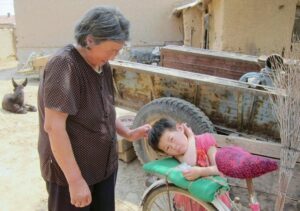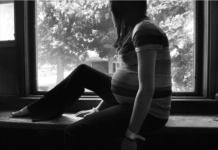(Note: I am applauding the L.A. Times for placing this story on their front page!)
By Barbara Demick, Los Angeles Times

June 15, 2012
LIJIN China — Six months pregnant, 38-year-old Ma Jihong was healthy and fit, her body toned from working in the cotton fields. So when 10 people from the local family planning office showed up one morning in October, she slipped through a gap in the concrete wall around the house and bolted like a sprinter toward the main road.
Five-year-old Yanyan, the younger of Ma’s two daughters, was alone in the house with her mother at the time. Her father came rushing in from the yard when he heard the screaming.
“My father tried to delay them. He used his arms to try to block them,” the little girl recalled last month in the family’s courtyard, cluttered with rusting farm equipment.
Wearing a pink polka-dot tutu and matching sandals, Yanyan waved her arms to imitate what her father did. “But there were too many people. He couldn’t stop them.”
Ma was caught and taken in for an abortion. Her family did not see her until later in the day. By then, she was lying in a bed in the Lijin County Hospital with a roll of toilet paper supporting her head. Her complexion was sallow and a dried stream of blood was under her nostrils, her mother-in-law, Gao Hongying, said.
“They took my daughter-in-law at 9 a.m. By 5 p.m., she was dead,” Gao said.
Forced abortions and sterilizations are the bane of villagers in this gentle farmland along the easternmost stretch of the Yellow River, about 200 miles southeast of Beijing. Across the country, overzealous enforcement of family planning rules, along with land confiscations, is one of the biggest sources of anger toward the Chinese Communist Party.
Graphic photos from another location, in Shaanxi province west of Beijing, of a grieving mother and her almost full-term aborted fetus went viral on the Internet in China this month. After more than 1 million microbloggers expressed their outrage — “Auschwitz in the womb” was one typical comment — three local officials were suspended Friday.
Even the Global Times, a newspaper linked to the Communist Party, weighed in, declaring in an editorial that “forced termination of late-term pregnancies must be condemned and banned.”
But the case was unusual only in the publicity that the photographs generated.
Walk into the village’s one general store and a group of men lets loose a stream of expletives about the coercive methods used by family planning officials. It is not that the men are morally opposed to abortion, they say, or even to limits on family size, but to the violence that often accompanies enforcement.
“I support the family planning policy, but not their methods,” said Ji Shuqiang, 42, working behind the cash register at the village store. “If they find a woman who’s pregnant, no matter how far along, they’ll make you have an abortion.”
An older man, who despite the urging of the others was afraid to give his name, said his wife had been sterilized 34 years ago after the birth of their only child, a daughter. He was still furious. “We hate family planning more than anything else. We don’t agree with the government’s policy on this.”
Enforcement of China’sone-child policy has become less violent since the 1980s and 1990s, when accusations of beatings, kidnappings and killings committed by family planning officials were common. But progress is uneven.
Shandong province, where Lijin is located, is also the home of Chen Guangcheng, the blind lawyer who recently ended up in the United States. Chen served four years in prison and nearly two under house arrest for challenging abuses in family planning.
A self-trained lawyer, Chen became a target of the Communist Party when he filed a class-action lawsuit in 2005, claiming that forced abortions and sterilizations in Linyi, his hometown about 150 miles from Lijin, violated Chinese law.
The law is vague, stating merely that family planning officials should “not violate the personal rights of civilians.” But it does allow for what are euphemistically called “remedial measures” to end unauthorized pregnancies.
“Forced abortion isn’t really legal, but the law isn’t clear and different jurisdictions interpret it different ways,” said He Yafu, a demographer and family planning expert.
To complicate matters, abortions and sterilizations are often performed at family planning clinics, where, by the admission of Chinese officials, medical training and equipment can be inadequate.
In 2009, a woman in Liaocheng, also in Shandong province, died after being forced to get an abortion a week before her due date. Family planning officials said that Feng Junhua bled to death during a staff shift change at the clinic.



